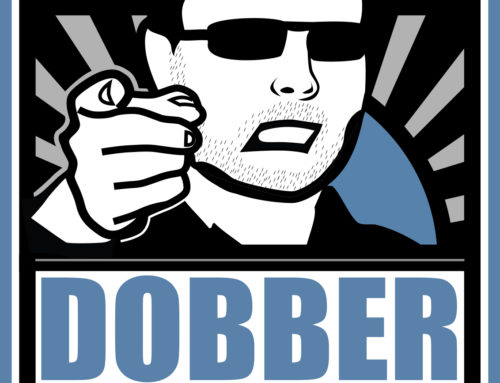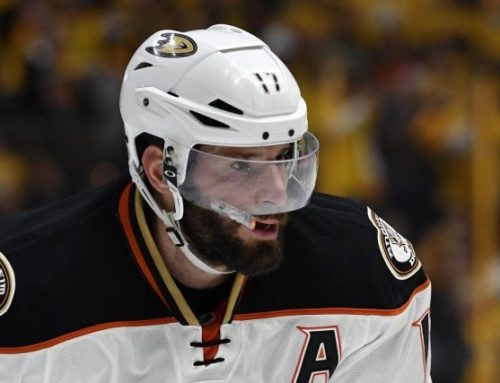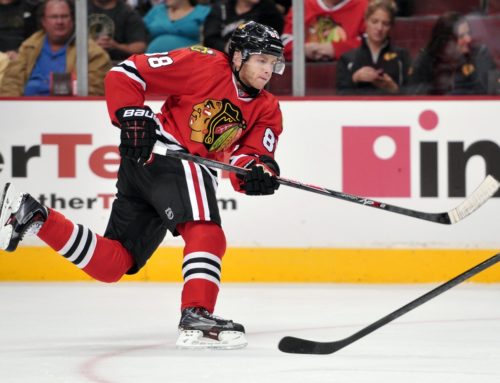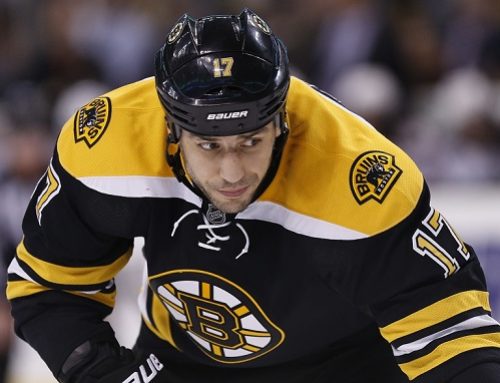
There are many moments during a game when a skater can afford the luxury of taking their eyes off the play. They can catch some air in the penalty box, quickly re-tie their skates or re-tape their stick on the bench or even take the rare shift off to recover from a gut-wrenching blocked shot.
Not so for a goaltender. They must be so attuned to the puck's movement that even the most sudden bounces must be stopped. Juicy rebounds off lively back-plates, crazy caroms off the glass, deflections, re-directions, hard shots from bad angles – it doesn't matter. If the goalie sees the puck, he must effectively make saves, control rebounds, recover quickly and be ready for the next shot. (*1)
The most difficult area on the ice for pro goalies to keep their eyes on the puck is below their goal line. No matter how hard a goalie tries, their eyes must detach from the puck, at some point, in order to turn their head from side to side. This is a fleeting but crucial moment for the goalie, as they must work extremely hard to re-attach their eyes to the puck as quickly as possible. If they fail to see a pass being made from behind the net, they are forced to guess on shots. As a result, they have to depend on instinct to make the save, instead of solid positioning and awareness.
Why the lesson in vision, you ask? For Evgeni Nabokov, three crucial goals allowed in his last two games were a direct result of losing sight of the puck on plays below the goal line or in his crease. These goals were momentary flaws in an otherwise awesome playoff run, but they still shed light on an area of weakness in Nabokov's game.
Dustin Byfuglien's overtime goal in Game 3 was a perfect example of a quick play from behind the net. Nabokov simply lost sight of the puck at the wrong time and was left totally helpless on the one-timed shot over his glove.
Brent Seabrook's opening goal in Game 4 came after Nabokov made a fine stand-up save, but left a tiny rebound just above his crease. Stuck in an erect stance, Nabokov was unable to cover the puck with his gloves. Bodies crashed the crease and blocked his vision of the puck, which was nestled behind his goal stick and in front of his leg pads. When Nabokov dropped to his knees, the puck was pushed underneath his pads and just over the goal line.
Dave Bolland's game-tying goal was another play where Nabokov failed to track the puck around the goal and execute cleanly. Although Bolland's play was routine in fashion, it was earlier in the shift where Nabokov spent too much time turning his head back and forth. Late in the period and late in his shift is when Bolland powered his way to the front of the net and put a deflected shot over a discombobulated Nabokov.
As you can see, things rarely come easy for a goalie in a playoff game. Just like everything else, there's simply no room for error in execution. To not have one's eyes on the puck is to not have the confidence and control needed to execute properly, so seeing the puck cleanly is always more important than executing correctly.
So after 71 games played during the regular season, an unsuccessful run in the Olympics and another 15 games in the playoffs, we are left with even more questions regarding Nabokov's future. His fantasy value for next season is questionable as well. It depends if he re-signs or becomes an UFA, where he plays and who he plays with. Until then, realize he's still an elite goalie with an efficient style that is capable of playing 70 and winning 35 to 40 games a year.
It may be considered another unsuccessful season for Nabokov in the eyes of many, but I still feel that he proved he's an elite goalie capable of winning at the highest levels. He didn't perform at his best in some crucial moments in the playoffs, but he still displayed a mastery of skills in almost every area. I was impressed with his .935 save percentage while down a goal (58-62) and his .941 save percentage in the third period (112-119).
When a goalie doesn't face a lot of shots, the ones he faces matter more. Unfortunately for Nabokov, he lost track of the puck at inopportune times against the Blackhawks. But if I were asked if he's still capable of winning the Stanley Cup, I would say absolutely. He has some of the best efficiency in the game and is the epitome of a true workhorse.
Therefore it's important to remember the runs that never pan out. Regardless of age or skill, goalies labeled a loser one year can just as easily be on the winning side of things next season. The difference between the two is negligible in so many situations that almost every playoff goalie could be considered capable of winning it all.
Remembering never. It seems like such a harsh way to reflect on Nabokov's season, but it is still a valuable lesson that must be learned. His future is still bright – his chance to win a Stanley Cup could easily come again next year.
The most talented goalie on the ice won't always win the game, nor will the goalie that performs the best. But the one who watches the path of the puck with more intensity and focus in that game usually will.
Because of this, I really feel like the goalie duel in hockey (and to be fair, soccer) is more interesting and exciting than any other showdown in sports. Both goalies are unique in the sense that they have an omniscience within the game. They see every moment of a hockey game from opposite ends in both active and passive mental aspects. They are both the overseers, the masters of ceremony, the ultimate purveyors and the silent analysts of each and every game.
- (1) The keen goaltender will find ways to create rare moments where they can take a physical and mental break from a game. Other than timeouts, of course, the goalie rarely gets a moment off. But they can push the net off their moorings, ask for a new stick, get time to repair a strap, finagle out of their mask, lose the puck in their pads or ask the referees to repair some ice in and around their crease, just to name a few.





 EDM
EDM STL
STL ANA
ANA TOR
TOR DET
DET NYI
NYI CAR
CAR MIN
MIN
